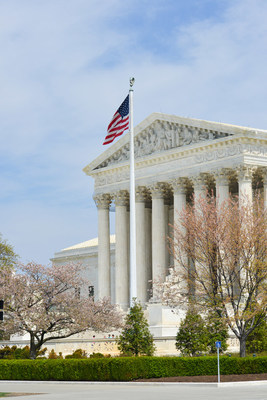U.S. Supreme Court Hears Arguments Regarding Arizona's Ballot Harvesting Law
SANTA CLARITA, Calif., March 8, 2021 /PRNewswire/ -- States across the U.S. watch with anticipation the outcome of the March 3rd U.S. Supreme Court Hearing regarding Brnovich v. Democratic National Committee (Brnovich), a case involving the extent to which states can enact laws to protect the integrity of the electoral process. Arizona and California are foremost among them because Landmark Legal Foundation submitted a friend of the court brief on behalf of Election Integrity Project®California (EIPCa) and Election Integrity Project®Arizona (EIPAz) supporting Arizona.
At issue in Brnovich is whether voting protections enacted by the state of Arizona violate Section 2 of the Voting Rights Act. The importance of the Landmark Legal Brief is that it includes EIPCa documentation of the impact of California's ballot harvesting laws that remove the chain of custody requirement, thereby allowing vulnerable populations and minorities to be exploited without fear of repercussion.
A challenge to the legality of Arizona's two election integrity measures has worked its way through the judicial system until it reached the Supreme Court. The first challenged law, known as the "out of precinct policy," requires individuals who vote in-person to cast their respective ballots at their designated precinct. The second law limits who may handle mail ballots on behalf of an individual voter, designating only the voter's close family members, mail carriers, and elections officials. Specifically banned are groups who target vulnerable populations and attempt to engage in ballot trafficking (ballot harvesting).
"It is our hope the Court will do the right thing and rule that all states, including Arizona, have the right to enact sensible measures to ensure the integrity of the electoral system," said Linda Paine, President of EIPCa. "The inherent risks associated with widespread use of vote-by-mail ballots demand common sense protections. States have a constitutional responsibility to ensure every lawfully cast ballot is processed in a fair, honest and transparent manner in order to protect citizens from unscrupulous entities who seek to adversely affect elections."
EIPCa and EIPAz's brief argues that protections are necessary to prevent voter disenfranchisement and loss of confidence in the fairness and accuracy of the electoral process. In California, for example, the lack of any significant protections of the integrity of the vote-by-mail process led to widespread ballot harvesting in 2018 and 2020. Unless prohibited by law, political operatives can and will target vulnerable populations such as senior citizens, young voters, indigents and noncitizens, collecting their ballots en masse without regard to whether those votes were executed properly. In short, lack of reasonable regulations leaves the system open to fraud.
"Arizona's policies apply equally and impose no barriers beyond the normal burden of voting," said Linda Paine. "Other states must avoid the problems that have plagued California's electoral system for years. If Arizona's laws are overturned, states will lack the ability to adequately protect the vote," added Paine.
A decision in this case is expected later this year. The full text of EIPCa and EIPAz's brief is available at: [HERE]
SOURCE EIPCa
News published on and distributed by:





